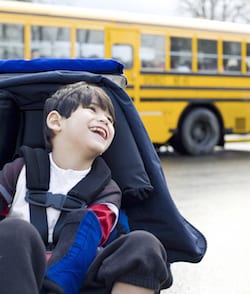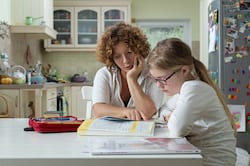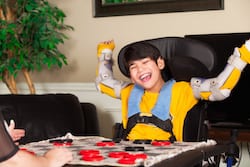5 First Day of School Tips for CP Families

Ready, Set, Let the New School Year Begin!
As summer comes to a close, the back to school jitters start to set in. While a new school year can be overwhelming for anyone, this time for parents of children with CP can come with a few extra concerns.
Fortunately, there are many things that parents and caregivers can do to ease this transition. To begin, try gradually involving your child in back-to-school preparations. Go shopping for school supplies together and help them pick out a new outfit or lunchbox. Afterwards, treat them to their favorite lunch or snack.
By slowly introducing your child to the idea of a new school year, they will likely experience less anxiety about a change in routine.
You can also offer pre-first day encouragement to your child by getting them excited about what they’ll learn, the new friends they’ll meet and fun after-school activities. The first day of school is a significant time for both of you, so kick off the school year with a positive outlook.
Here are 5 tips for children with CP (and their parents) to help successfully kick off the school year:
1. Ease Into The First Day

A new daily routine can take some adjusting, and this is especially true for children with CP.
A few weeks before the school year begins, start implementing new bedtime hours. Oftentimes, a child with cerebral palsy may take more time getting ready for bed or have difficulty falling asleep.
Try establishing a calming nightly routine, such as a warm bath and comforting bedtime story to help your child go to sleep and stay asleep. Also, give yourself plenty of time to prepare in the morning before heading out the door.
Some additional the ways you can help get rid of your child’s first day jitters include:
- Eating a delicious, wholesome breakfast. Whip up your child’s favorite meal to start the day out on the right note.
- Planning out an outfit the night before. Make it a fun parent/child activity by prearranging clothes for the week. That way, you won’t have to play the “dirty or clean game” in the morning.
- Scoping out the classroom. Dropping your child off for their first day of school can be emotional for you both. Things like helping your child set up their new desk can keep their nerves at bay.
2. Pack A Simple, Yummy Lunch
Lunchtime at school can be a hectic time of day. In children with CP, mobility limitations can add a sense of uncertainty during these breaks.
To make it easier on your child’s hand or muscle limitations, try using an easy-to-open lunchbox that they’ll be able to better manage. Meals and snacks are usually best kept simple, so try to stay away from any messy foods that are likely to spill or leak.
Easy lunches and snacks ideas include:
- Yogurt
- Banana or other soft fruit
- Sandwich pinwheels
- Cubed food, like chicken or cheese
- Veggie sticks
3. Create A Fun Homework Routine

A new school year means a new set of projects and homework assignments. As many parents of children with CP know, CP comes with an added risk of other learning and behavioral disorders.
You can help motivate your child to stay on top of their assignments by establishing a homework routine that they’re comfortable with. For instance, give them time to unwind after school by playing their favorite game, having an afternoon snack or hanging out with friends or siblings. Afterwards, they’ll be ready to get started on their tasks.
You can make homework and study-time more enjoyable for a child with CP by:
- Taking frequent breaks
- Offering positive reinforcement
- Creating an exciting learning environment
- Using fun, visual activities to represent confusing concepts or assignments
- Keeping distractions to a minimum
4. Plan For Your First Parent-Teacher Meeting
Typically within the first few weeks of school, parents will have an opportunity to meet their child’s teacher. This is a perfect chance to openly communicate about how much inclusion is best for your child, and ways that they can receive extra help.
Children with a less severe type of CP usually prefer to be mainstreamed in the normal class setting. This allows for them to form relationships with their peers and gain independence while at school. On the other hand, some children with more severe types of CP or coexisting disorders may prefer a special education program that provides them with the individualized attention they need.
By working together with your child’s teacher, you can coordinate the best education plan for your child. Some topics to discuss in your first parent-teacher meeting may involve:
- Allotted time for completing tasks
- Goals and learning objectives
- Upcoming medical appointments
- Possible classroom obstacles
- Any mobility or communication limitations
5. Encourage Extracurricular Activities

Children have lots of energy. It’s essential for children with CP to take part in activities outside of the classroom. Participating in extracurricular activities is a fun way to build social skills and gain more independence and confidence.
Some extracurricular activities that can be beneficial for children with CP include:
- Sports teams
- Academic clubs
- Music classes, band or chorus
- Art classes
Making The First Day of School A Success
Once you’ve made it past the first day, you’ll have an idea of what to expect for the remainder of the school year. While there may be a few bumps along the way, you’ll be more prepared to take on any obstacles that may arise.
A child with cerebral palsy is likely to experience some hesitations about how their classmates will react to their condition. By showing that you are your child’s biggest cheerleader, they will be able to confidently make the most of their time at school.
